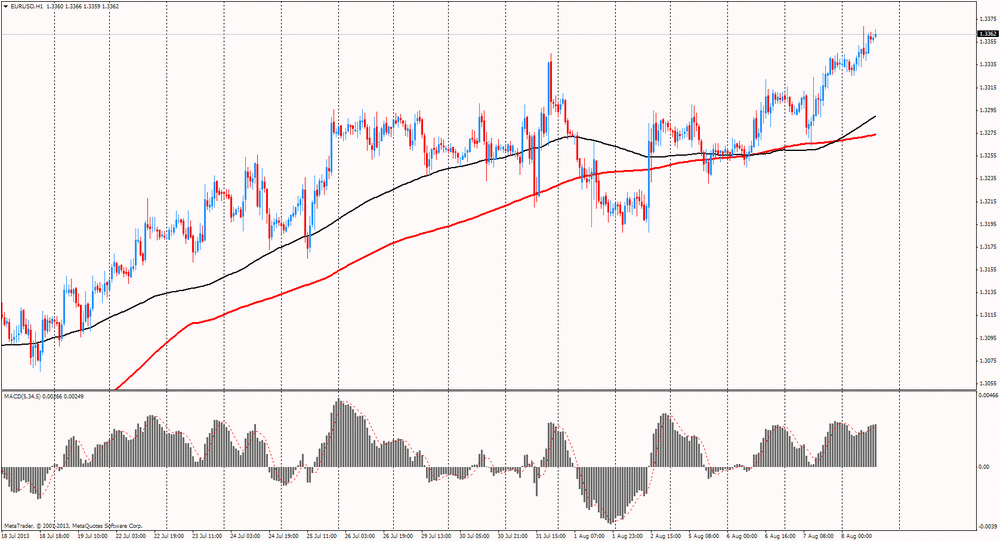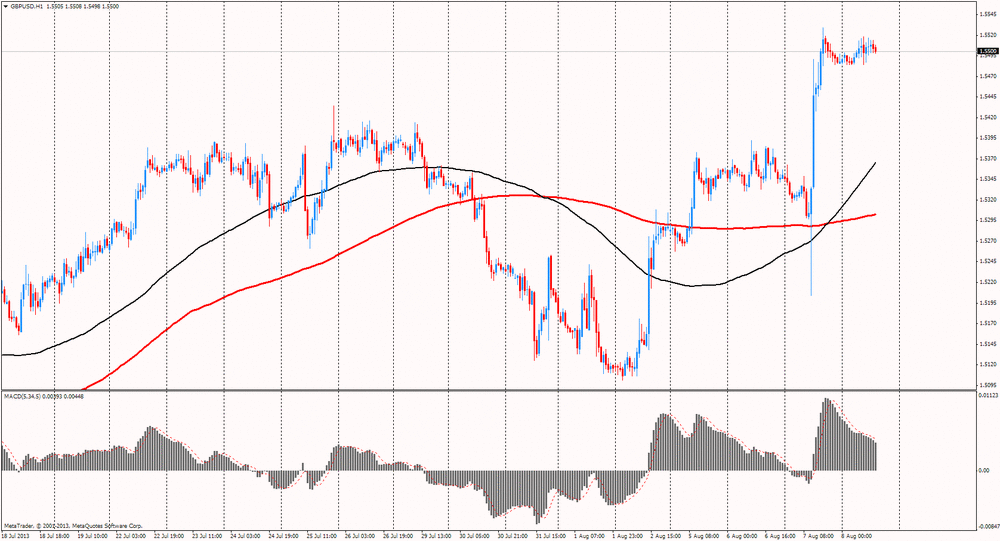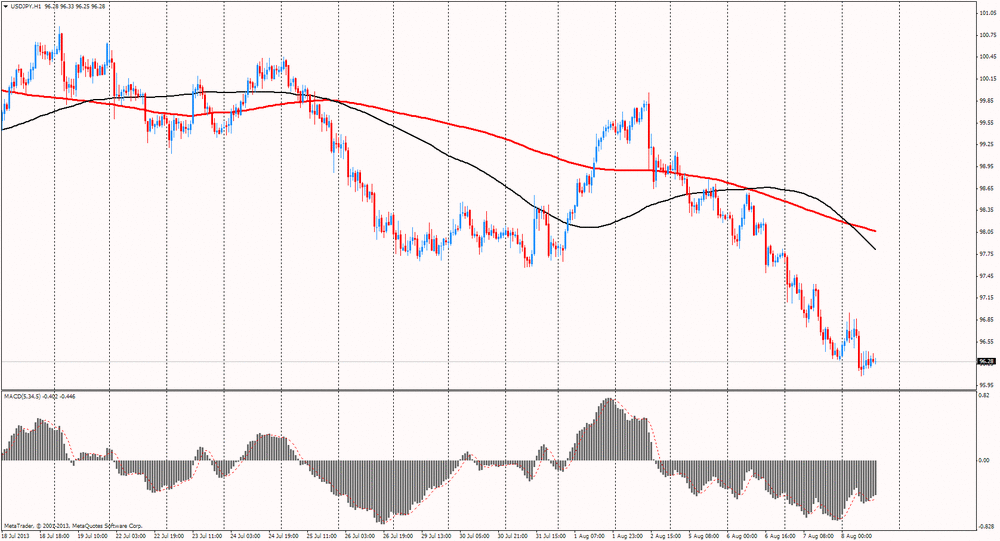- Analytics
- News and Tools
- Market News
- European session: the euro exchange rate rose against the dollar
European session: the euro exchange rate rose against the dollar
Data
01:30 Australia Unemployment rate July 5.7% 5.8% 5.7%
01:30 Australia Changing the number of employed July +10.3 +6.2 -10.2
02:00 China Trade Balance, bln July 27.1 26.2 17.8
02:30 Japan BoJ Interest Rate Decision 0.10% 0.10% 0.10%
02:30 Japan Bank of Japan Monetary Base Target 270 270
02:30 Japan BoJ Monetary Policy Statement
05:00 Japan Eco Watchers Survey: Current July 53.0 53.5 53.2
05:00 Japan Eco Watchers Survey: Outlook July 53.6 54.1 53.6
05:45 Switzerland Unemployment Rate July 3.2% 3.2% 3.2%
06:00 Germany Trade Balance June 14.1 15.2 15.7
06:00 Germany Current Account June 11.2 17.0 17.3
07:30 Japan BOJ Press Conference
08:00 Eurozone ECB Monthly Report August
European currency strengthened against the U.S. dollar, which has helped to publish data on Germany and the ECB's monthly economic report.
The Federal Statistical Office reported that up to June of the year German exports rebounded, which was supported by strong demand from countries not included in the composition of the euro area, while the volume of imports unexpectedly declined, reflecting the weakness in domestic demand.
According to the report, the volume of exports, adjusted for working days and seasonal changes, rose in June by 0.6%, compared with a revised fall of May at 2%. However, the growth rate was weaker than the average forecast from the experts - at the level of 0.9 percent. As for imports, its volume decreased by 0.8%, after rising 1.4% in May, which was revised. Economists had forecast that imports will rise by 0.5%.
As a result of opposing trends in export and import trade surplus with Germany in June this correction was 15.7 billion euros in May from a revised value of 14.6 billion euros. These were better than analysts' forecasts, according to which the surplus was 15.2 billion euros.
As for the ECB bulletin, he confirmed the intention of the ECB to keep interest rates at the current (0.5%) and a lower level for a long time. Monetary policy will remain accommodative for as long as it is required in order to support the economic recovery, which is expected to grow by gradual pace over this year and next.
Meanwhile, the ECB has identified several risks to the economic recovery of the region, namely, the continuing uncertainty in global financial markets, the likelihood of a weaker-than-expected domestic and external demand and the inability of national governments in Europe to the timely and consistent implementation of the necessary reforms.
The yen rose sharply against the dollar, against the background of the Bank of Japan did not make any changes in monetary policy by abstaining from the expansion of unprecedented stimulus programs. In this case, the Central Bank did not revise and assess the current state of the Japanese economy, and macroeconomic forecasts. The statement said the Bank of Japan, its leaders decided to wait for new signals that will clarify the situation.
Central Bank noted in a statement after the meeting that the economy "is recovering at a moderate pace," while others "as a whole gradually sent to revive growth" despite the lingering pockets of economic weakness. The Bank of Japan has also confirmed the growth of exports and drew attention to the weakening of the investment company which ceased amid rising corporate profits.
We also add that the Japanese government approved a medium-term financial plan, which includes a reduction of $ 4 trillion. yen in each of the next two years in order to achieve the national goals of financial reform in 2015 financial year.
It is learned that the government intends to achieve a primary deficit of 18.9 trillion yen in fiscal year 2014 and 15.2 trillion yen deficit in 2015 fiscal year, against 23.2 trillion. yen in the current year.
Reduce costs in conjunction with other measures, as well as optimistic goals of economic growth, should take primary deficit to around 3.3 percent of gross domestic product in 2015 fiscal year, - the government of the country. That is, the rate should be reduced by half compared with 6.6 percent in fiscal year 2010.
However, the plan assumes that the government should take additional measures and balance the budget by 2020 financial year, as according to the latest plan primary balance will still be minus 2.0 per cent of GDP in that year.
The cost of the Australian dollar sharply higher against its U.S. counterpart, which has helped to publish a positive report on Australia.
As shown by the data, which were presented the Australian Bureau of Statistics, the unemployment rate in Australia has not changed in July, but many workers have lost their jobs, creating concerns about slowing economic growth.
According to the report, the seasonally adjusted unemployment rate was at 5.7% last month. Economists had expected the unemployment rate will stay at around 5.8%.
In addition, it was reported that the number of employed fell by 10.2 thousand compared to the expected growth of 6 thousand in July, the number of employees, full-time workers fell by 6.7 million, while part-time - 3, 5 thousand bureau also reported that the labor force, or the proportion of the working population of working age, or people who are actively looking for work in July fell to 65.1% from 65.3% in June, against expectations of 65.3%.
EUR / USD: during the European session, the pair rose to $ 1.3369
GBP / USD: during the European session, the pair fluctuates within a narrow range
USD / JPY: during the European session, the pair fell to Y96.09
At 12:30 GMT Canada will present the price index for housing in the primary market in June. At 17:00 GMT the United States places the 30-year bonds. At 23:50 GMT Japan will release the index of activity in the service sector in June.
© 2000-2026. All rights reserved.
This site is managed by Teletrade D.J. LLC 2351 LLC 2022 (Euro House, Richmond Hill Road, Kingstown, VC0100, St. Vincent and the Grenadines).
The information on this website is for informational purposes only and does not constitute any investment advice.
The company does not serve or provide services to customers who are residents of the US, Canada, Iran, The Democratic People's Republic of Korea, Yemen and FATF blacklisted countries.
Making transactions on financial markets with marginal financial instruments opens up wide possibilities and allows investors who are willing to take risks to earn high profits, carrying a potentially high risk of losses at the same time. Therefore you should responsibly approach the issue of choosing the appropriate investment strategy, taking the available resources into account, before starting trading.
Use of the information: full or partial use of materials from this website must always be referenced to TeleTrade as the source of information. Use of the materials on the Internet must be accompanied by a hyperlink to teletrade.org. Automatic import of materials and information from this website is prohibited.
Please contact our PR department if you have any questions or need assistance at pr@teletrade.global.


















